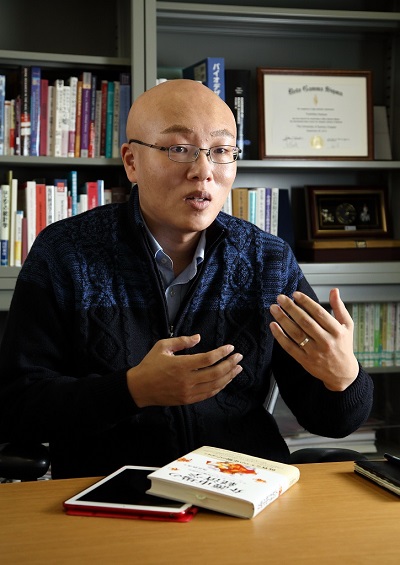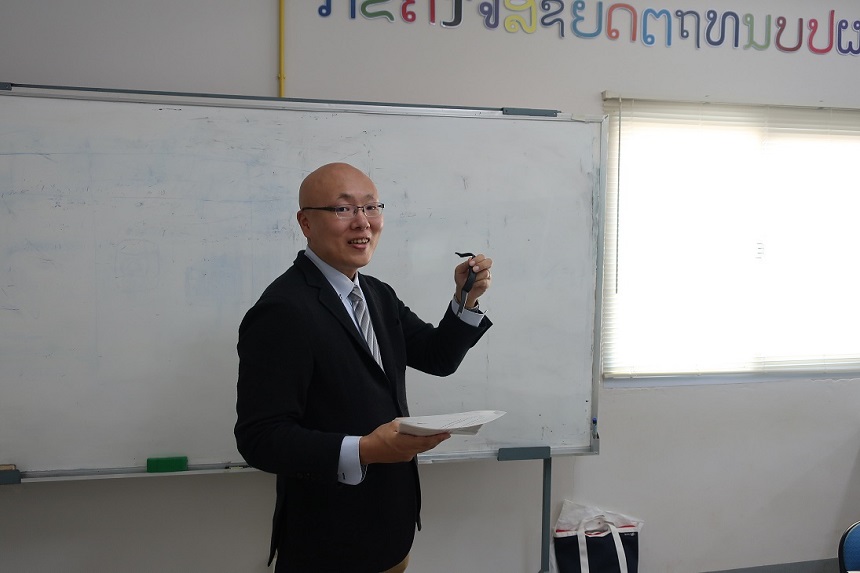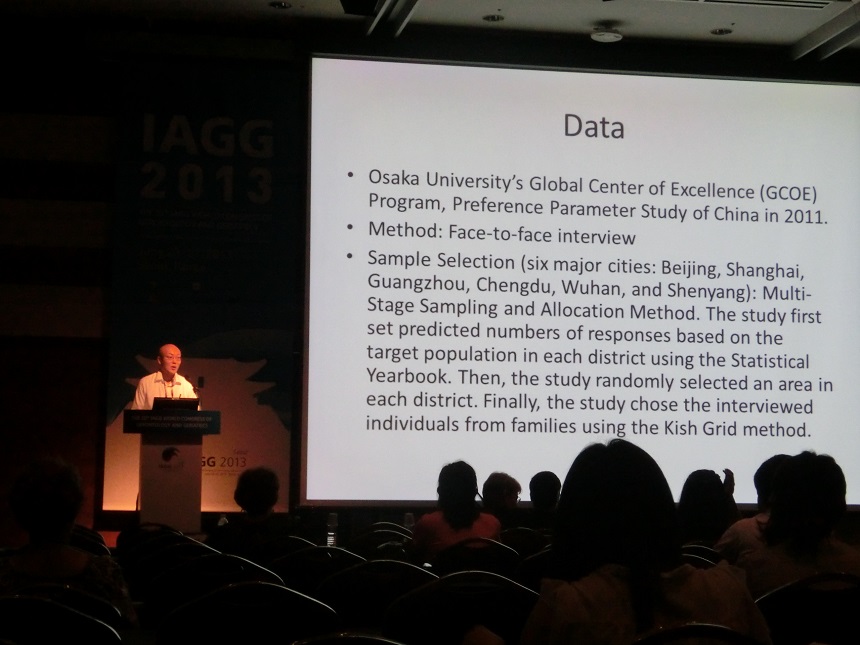On February 1, 2013, Hiroshima University established two new programs: the “Distinguished Professors” (DP) program and the “Distinguished Researchers” (DR) program. Individuals who are part of these programs are recognized as senior and junior faculty members respectively, who are engaged in extraordinarily distinguished research activities.
Interview of Distinguished Professor Yoshihiko Kadoya

Presenting concrete solutions to the challenges of societal aging based on economic analysis: Developing a Japanese model to help societies around the world cope with the challenges ahead
My interest in applied economics and the problem of societal aging driven by experiences overseas
My field of expertise is health economics, a field that approaches various issues in health from an economic perspective. It was my experiences overseas that led me to specialize in this field. One such experience was when I went to the U.S. during my master’s degree and interned at an agricultural support NPO. There, researchers from the local university used statistics to help market agricultural products. I was astonished to see how far the application of statistics and economics had progressed in the U.S. Having made up my mind to study in this field and become a researcher; I won a full scholarship to pursue a PhD at the University of Sydney in Australia. There, I became interested in health economics. Japan has the world's highest aging rate, and the world is keeping a close eye on how the situation is unfurling here. I was intrigued by the notion of approaching the issues of healthcare and long-term care using the economics skills I had learned. This prompted me to begin my research and earn a doctorate with a study on the long-term care market model as a human service.
Measuring emotional states and analyzing their relationship to labor productivity
I believe that every science involves some aspect of data analysis. And what data analysis in economics excels in is the analysis of "dirty data"—i.e. data with many uncertain elements. For example, economic activities and policies are greatly influenced by the surrounding environment, such as the culture, history, and system of a particular time or region, and the actions and choices of individuals can be influenced by their emotions. It is our job to clean and analyze such irrational and uncertain data using complex statistical methods and draw inferences about causes and effects. I would like to utilize this advantage of being able to take into account various influences in analysis to solve a variety of complex and intertwined social problems that are difficult to comprehend from a single field approach. With this in mind, we are conducting research to see if we can offer concrete solutions to social issues by becoming a hub that integrates various fields such as psychology and engineering, as well as medicine and social security.
In particular, we have achieved results in research related to health management that have attracted attention in many countries. We asked factory workers in Laos to wear a biometric device and scientifically determined their emotional state based on the fluctuations of their measured heartbeat rhythm. We then analyzed the relationship between emotional state and labor productivity. The results showed that feeling happy at work increased labor productivity. This paper, published in English, has received media coverage in Europe, Canada, Australia, and other countries. After this, we also analyzed the relationship between emotions and road safety among taxi drivers in Hiroshima. We hope to analyze various industries to explore how to create comfortable working environments for employees.

There is competition among factories for human resources in special economic zones in Laos. "Improving the working environment is good for both management and workers," says Professor Kadoya.
Addressing risks associated with more people living to a hundred and beyond through financial literacy
Recently, my research has been focused on financial literacy and mental health. Financial literacy refers to the knowledge needed to make decisions about one's finances, such as the concept of compound interest, inflation rates, and risk aversion. In his book Capital in the Twenty-First Century, economist Thomas Piketty provided evidence substantiating concerns that the rate of return on capital will be greater than the rate of economic growth, and pointed out that neglecting capitalism will lead to growing inequality. In today’s world where the amount of money you can earn by investing in financial products could potentially increase faster than the rate at which your salary increases, having financial knowledge has become a major factor in our lives. I started my research to see if I could come up with any concrete suggestions on how to deal with these changes.
Analysis of the data obtained from national surveys shows that a high level of financial literacy can reduce anxiety in old age through asset accumulation. It is believed that a certain level of knowledge about finance enables people to make appropriate decisions about saving and investing, leading to risk anticipation and thus reducing anxiety to that extent. We also analyzed the relationship between financial literacy and health behaviors, such as smoking and exercise habits, as well as the relationship between financial literacy and understanding of how to protect assets from the risk of cognitive decline, such as deciding in advance on an adult guardian to make contracts on behalf of a person with poor judgment. These studies show that high levels of financial literacy are likely to reduce the various life risks associated with living longer and, through this, have a positive impact on improving mental health.
The results of these studies have been published in the world's media, and we have received requests for research reports from international organizations such as the Asian Development Bank Institute and the World Health Organization (WHO), as well as from governments and central banks in Japan and other Asian countries. This high level of attention shows how concerned the world is about societal aging and the impact of people's anxiety over retirement, and the need for solutions. One of the directions that Japan should take as a developed country with a low birthrate and an aging population is to take the lead in the global market in this field, including the development of aging industries such as long-term care robots and healthcare devices. Furthermore, we in Japan need to present the world with a social model in which longevity does not lead to anxiety for either the elderly or the young. I hope to continue promoting research that will be useful for this purpose from a broad perspective.

Professor Kadoya's research has attracted a lot of attention overseas, and he has had many opportunities to present his work at conferences around the world

 Home
Home